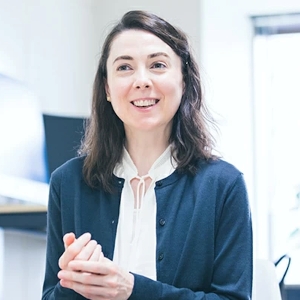Submitted by Rachel Gardner on Tue, 27/05/2025 - 12:26
 Dr Katie Seaborn will be joining us as a new member of our faculty in February 2026. She is coming here as an Associate Professor in Human-Computer Interaction and will be contributing to both our research and our teaching in this area.
Dr Katie Seaborn will be joining us as a new member of our faculty in February 2026. She is coming here as an Associate Professor in Human-Computer Interaction and will be contributing to both our research and our teaching in this area.
"We're living in an exciting and perilous time," Katie says, "where computing technologies are influencing how we think, work, and play at a grand scale. A human-centred perspective is needed to tackle the breadth of challenges and opportunities we face in ways that align with our values and vision of the future. This is a wicked problem that requires critical and interdisciplinary engagement as much as technical finesse."
Katie is currently an Associate Professor in the Department of Industrial Engineering and Economics at the Institute of Science Tokyo (formerly the Tokyo Institute of Technology).
She is also an Associate Faculty Member in the Engineering Sciences and Design programme there, and Director of the Aspirational Computing Lab.
"In a time when computing technologies are influencing how we think, work and play at a grand scale, a human-centred perspective is needed to tackle the challenges and opportunities we face."
Dr Katie Seaborn
Aspirational computing is described as "a multidisciplinary initiative that aims to spark innovative research and design practice in human-computer interaction at the crossroads of critical computing, psychology, and intersectional design".
As founder and head of the Lab, Katie's goal is to critically examine how computers affect people and societies, identify fundamental problems and opportunities, and explore novel solutions from an aspirational lens.
Before academia, she worked in the public and private sectors as an interaction designer, user experience developer, and web programmer in Canada and the UK.
Following a BA and MSc in Interactive Arts and Technology at Simon Fraser University in Canada, Katie completed her PhD in Mechanical and Industrial Engineering at the University of Toronto in 2016.
She then worked as an Intel-funded Research Associate at University College London (UCL) before taking up a Postdoctoral Fellowship sponsored by a Japan Society for the Promotion of Science Postdoctoral Fellowship at the University of Tokyo.
After this, she moved into a researcher position at the Japanese National Research and Development Agency RIKEN in the Center for Advanced Intelligence Project, while holding an Honorary Researcher position at the UCL Interaction Centre (UCLIC). She has been a full-time Associate Professor at the Institute of Science Tokyo since 2020.
She holds a Japan Science and Technology Agency (JST) PRESTO grant and a Grant-in-Aid for Scientific Research (B) from the Japan Society for the Promotion of Science.

